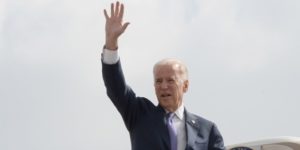

Adam Eliyahu Berkowitz – May 11, 2022
US President Joe Biden is planning a visit to Israel in June. Still, a recent report claims that while here, he will visit the eastern section of Jerusalem in a clear message of support for establishing a Palestinian capital in the Jews’ eternal capital.
CNN reported on Monday that the President’s office had announced unfinalized plans for the visit to the eastern section of Jerusalem. The president may visit Al Makassed Hospital, located on the Mount of Olives. It is the largest Palestinian medical center in Jerusalem. Nearly 80% of the hospital employees are residents of the West Bank who have special permits to enter Israel.
No US president has ever visited this section of Jerusalem. This stands in stark contrast to President Trump, who prayed at the Western Wall. In addition, the Biden administration had pledged to reopen a consulate for Palestinians in the eastern section of Jerusalem after Trump closed the consulate when he moved the American embassy from Tel Aviv to Jerusalem.
Barry Shaw, a Senior Associate at the Israel Institute for Strategic Studies, criticized Biden’s decision:
“He has demanded that he will not be accompanied by any Israeli official but will meet members of the Palestinian Authority who have been permitted to administer certain hospitals and schools in east Jerusalem but who insist that their capital will be in Israel’s undivided and sovereign capital, Jerusalem, even though their government and administrative…offices are in Ramallah.”
“This is a devious way for Biden and his State Department to get back at Israel and drive a wedge into Israel’s legitimate and exclusive sovereign rights over its Jerusalem capital, following Israel’s refusal to allow the State Department to open a US consulate there to serve Palestinians.”
“This visit…is likely to damage US-Israel relationships in a very profound way. While Biden is prepared to visit Jerusalem and meet Palestinian officials, his White House has publicly opposed the building of Jewish homes in Judea. Both over this issue and that of Iran, the gap is widening between Jerusalem and Washington.”